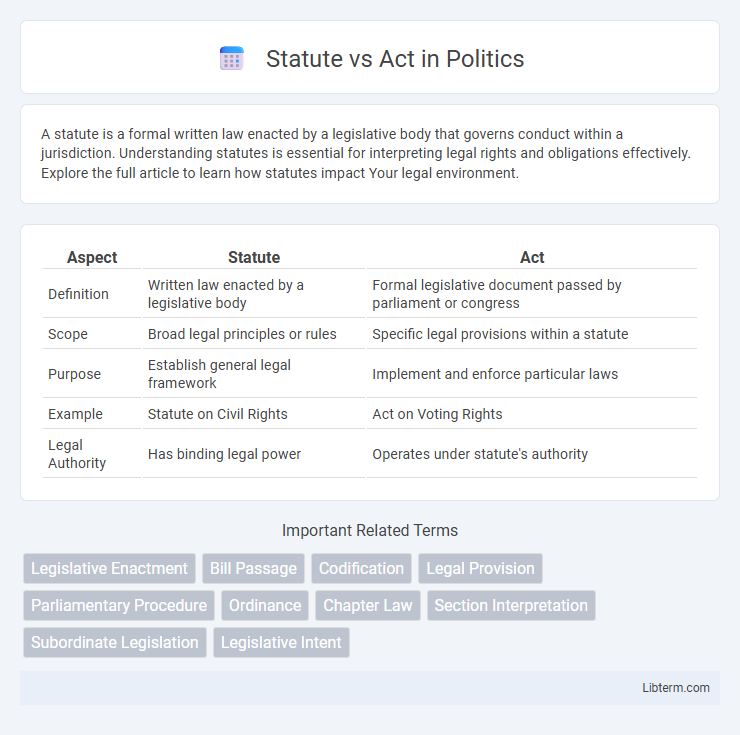A statute is a formal written law enacted by a legislative body that governs conduct within a jurisdiction. Understanding statutes is essential for interpreting legal rights and obligations effectively. Explore the full article to learn how statutes impact Your legal environment.
Table of Comparison
| Aspect | Statute | Act |
|---|---|---|
| Definition | Written law enacted by a legislative body | Formal legislative document passed by parliament or congress |
| Scope | Broad legal principles or rules | Specific legal provisions within a statute |
| Purpose | Establish general legal framework | Implement and enforce particular laws |
| Example | Statute on Civil Rights | Act on Voting Rights |
| Legal Authority | Has binding legal power | Operates under statute's authority |
Definition of Statute
A statute is a formal written law enacted by a legislative body, serving as a primary source of legal authority within a jurisdiction. It provides specific legal rules and frameworks to govern conduct, distinguishable from other legal instruments such as regulations or case law. Statutes are codified and published to ensure clarity and public accessibility of legal obligations and rights.
Definition of Act
An Act is a formal written law enacted by a legislative body, such as a parliament or congress, that has passed through the required procedures to become legally binding. It serves as the primary source of statutory law, outlining specific legal obligations, rights, or regulations to govern behavior within a jurisdiction. Unlike broader legal concepts, an Act represents a concrete legal instrument that codifies legislative intent into enforceable rules.
Key Differences Between Statute and Act
Statute refers to a law formally enacted by a legislative body, emphasizing its codified and written nature, while an Act is a specific statute that has been passed and officially recorded as law. Key differences include that statutes encompass all written laws, including regulations and codes, whereas an Act specifically signifies a bill that has completed the legislative process and received approval. Statutes provide the framework for legal obligations, and Acts represent the finalized legislation that enforces these statutes.
Origin and Legislative Process
A statute originates from the formal legislative process where elected lawmakers draft, debate, and enact laws within a parliamentary or congressional framework, resulting in codified legal rules. An act is essentially a statute that has successfully passed through all legislative stages, including introduction, committee review, voting, and executive approval or veto override, thereby becoming law. The origin of both terms lies in legislative authority, but "act" emphasizes the completed enactment phase following the initial proposal and drafting of statutory law.
Purpose and Scope
A statute is a written law enacted by a legislative body that outlines broad legal standards and general rules applicable within a jurisdiction. An act, often synonymous with a statute, specifically refers to a single piece of legislation passed by a legislative authority, detailing precise provisions and enforcement mechanisms. The purpose of a statute is to establish foundational legal frameworks, while an act focuses on implementing specific regulatory objectives within its defined scope.
Legal Authority and Enforcement
A statute is a law formally enacted by a legislative body, such as a parliament or congress, providing clear legal authority and framework for governance. An act refers specifically to a statute that has passed all legislative stages and received formal approval, making it legally binding and enforceable by government agencies and courts. Enforcement mechanisms are grounded in the act's provisions, allowing authorities to apply penalties or remedies as prescribed under the statute.
Examples of Statute and Act
The Statute of Frauds, enacted in 1677, is a classic example of a statute requiring certain contracts to be in writing to be enforceable. In contrast, the Civil Rights Act of 1964 is a landmark act that prohibits discrimination based on race, color, religion, sex, or national origin in employment and public accommodations. Statutes like the Uniform Commercial Code (UCC) serve to standardize laws across states, while acts such as the Affordable Care Act (ACA) introduce comprehensive reforms in healthcare policy.
Impact on Legal System
Statutes are laws formally enacted by legislative bodies, providing clear, codified rules that shape judicial decision-making and create binding legal standards. Acts, often synonymous with statutes, specifically refer to individual laws passed during legislative sessions, directly influencing legal interpretations and enforcement priorities. The precise drafting and implementation of statutes and acts enhance legal predictability, consistency, and the systematic development of case law within the legal system.
Common Misconceptions
A common misconception is that statutes and acts are interchangeable terms, but an act is specifically a bill that has been passed by a legislative body and formally enacted into law, while a statute refers to the written law itself, which can include acts codified into legal codes. Many people falsely believe all statutes originate as acts, yet some statutes emerge from judicial decisions or administrative regulations. Understanding this distinction is crucial for accurately interpreting legal texts and legislative processes in statutory law.
Statute vs Act: Summary Table
A Statute is a written law enacted by a legislative body, while an Act is a formal piece of legislation that has been passed and enacted into law. The summary table distinguishing Statute vs Act highlights that statutes often serve as the broader category of laws, with acts being specific types of statutes that have undergone full legislative approval. Key differences include the enactment process, scope, and application, where statutes represent the entire body of written laws and acts are individual laws within that body.
Statute Infographic

 libterm.com
libterm.com